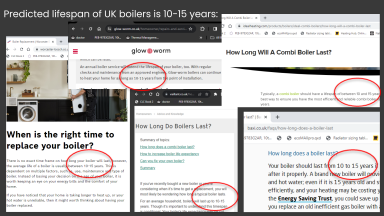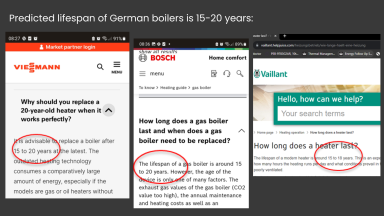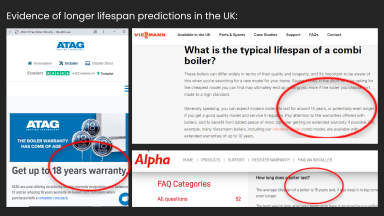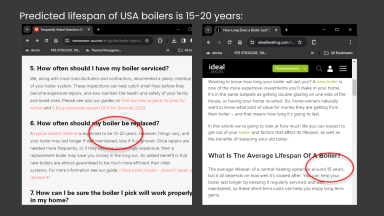How long should a boiler last before it needs replacing? 10, 15, 20, 25 years?

UK households replace their boilers just half way through their lifespan and for little or no reduction in gas bills. Why? We uncover the culture of premature replacement in the UK and explain why keeping your boiler is up to 55% cheaper than replacement.
A new boiler typically costs around £2,250 - £3,660*. Not replacing your boiler prematurely is one of the bigger savings a household can make in any year and it is far from a risky decision. Contrary to prevailing wisdom, a boiler might be approaching the end of its life at 20 years, but certainly not at 10 years, and we only have to look to Germany where 20+ year old boilers are the norm (and yes, they are the same boilers). Our culture of overreplacement means a whopping 75% of gas households have a boiler that is 12 years old or less. The upside is that 18 million households won't need to change their boiler before moving to a heat pump in the next decade.
Contents
- How long should a boiler last?
- German boilers last twice as long!
- Why are predicted lifespans up to 10 years shorter in the UK?
- The boiler lifespan lottery
- The evidence exposing premature replacement
- FIVE top tips to avoiding premature replacement
- Better ways to spend your 'new boiler' budget
- What is the future for gas boilers?
1. How long should a boiler last?
Gas boilers should last 22 years** (including modern condensing boilers) yet the five biggest UK boiler manufacturers - Worcester Bosch, Baxi, Vaillant, Glow worm and Ideal - give a predicted lifespan of just 10-15 years*** (see website clips in the image below). Anecdotally some installers and sales intermediaries go even further to warn consumers that a boiler is ‘approaching the end of its life’ at 7-9 years. Certainly by 10-12 years our experience is that most households are anticipating replacement.

2. German boilers last twice as long!
The story in Germany couldn't be more different. 40% of gas boilers are aged 15 years or older of which 28.5% are 20 years or older⋄. German households expect their boilers to last 20 years° with the three biggest German boiler manufacturers - Viessmann, Bosch and Vaillant - giving predicted lifespans of 15-20 years on their websites (image below)**. Yet in the UK, Worcester Bosch (owned by Bosch) and Vaillant give just 10-15 years for the same boiler models and only Viessman states around 15 years or longer. For Worcester Bosch and Vaillant boilers (and Glow worm boilers owned by Vaillant), that's up to 10 years less lifespan.

3. Why are predicted lifespans up to 10 years shorter in the UK?
A difference in installation quality is often cited as the reason why the same boilers can last twice as long in Germany. It is generally understood that German installation practices are more rigorous and advanced weather compensation controls are used as standard, but this should not affect the predicted lifespans given by manufacturers elsewhere even if it affects actual lifespans. Knowingly shortening the predicted lifespan by up to 10 years would have to be due to a lower build quality or evidence of widespread product failures in the UK.
It seems highly unlikely that either of these things are true, particularly as Dutch brand ATAG now offer an 18 year warranty in the UK and Viessmann and Alpha boilers (a UK manufacturer) give a lifespan of 15 years or longer on their UK websites (see screengrabs below). It is clear that UK fitted boilers have a predicted lifespan beyond 10-15 years irrespective of disparities in working practices. Rather we have a self fulfilling prophecy at play in UK whereby the industry has normalised early replacement by advertising 10-15 year lifespans.

Predicted vs actual lifespans
A material shortening of actual lifespan due to increased wear and tear is never-the-less a concern. UK boilers are left unoptimised and cycle more, but whilst this might give rise to more repairs over their lifetime, it does not make repairs sufficiently uneconomical to justify the cost of early replacement. Nor does it stop many mainstream UK boiler insurers from taking boilers onto contract at any age. Only multiple parts failures could come close to the cost of a new boiler and catastrophic failures of this kind are thankfully rare. Breakdowns are an opportunity to sell a new boiler however and this is where UK households are more vulnerable (more on this below).
Cultural differences
The divergence in lifespan expectations is instead most likely a cultural one defined by 1) our differing perceptions of value, 2) the evolution of the 10-year warranty and 3) who our trusted advisors are, underpinned by the 10-15 year lifespan predictions.
Are we undervaluing our boilers?
German households spend more upfront on a high quality installation with an expectation it will last. In the UK we fit predominately combi boilers which are comparatively low cost and quick to fit, but are not lower quality. Whilst we might have come to value boilers less, a lower installation cost won't result in a shorter lifespan by itself. We should still expect ~20 years of operation and manufacturers such as ATAG have shown they are are prepared to support 18 years of that lifespan under warranty in the UK.
Warranty lengths have become tied to perceived lifespans
At one time all boilers came with a 2-year warranty, but a 'war of warranties' began between the big boiler manufacturers around 2008 as each strived to get a sales edge over the other. Warranties were initially extended to five years, then seven, then eight if the boiler was fitted with the manufacturer's filter, then 10 years if it was fitted with the manufacturer's control and some manufacturers have nudged to 12 years. A 7-12 year warranty is great value for consumers, but warranty lengths have become tied to lifespan predictions and now feed into the culture of premature replacement.
Who is telling us when it's time to replace?
In Germany, only the 'chimney sweep' will say when the boiler is no longer 'fit for purpose' i.e. unsafe or doesn't meet emissions/efficiency tests. In the UK, any gas engineer can and often does suggest replacement simply because a part needs replacing. Our experience is that boilers over 7 years of age that need a repair are often recommended for replacement by gas industry operators with a vested interest in selling and fitting new boilers.
4. The boiler lifespan lottery...
The screen grabs below show that lifespan predictions vary in other countries too, suggesting a boiler lifespan lottery depending on where you live. Ideal state 15 years in the US and just 10-15 years in the UK. Viessmann state 15-20 years in the US and Germany and '15 years or longer' in the UK, but don't ever state from 10 years. It is the '10' in the 10-15 that leads consumers to believe a boiler might be approaching the end of its life at 7-9 years and really pushing its luck by 15 years, assuming it hasn't been replaced before then.
We want all boiler manufacturers in the UK to be consistent with their websites in Germany and the US and give lifespan predictions of at least 15 years but ideally 15-20 years and drop the 10. As the next section sets out, it is clearly leading consumers astray.

5. The evidence exposing premature replacement
There is plenty of statistical evidence that supports the UK's culture of overreplacement and anecdotal evidence that exposes the unsubstantiated claims persuading far too many of us to replace over repair:
1) Statistical evidence
The evidence of overreplacement is present in the UK’s annual gas boiler sales and the age of our boiler stock compared to Germany:
- The UK fits 1.76 million new boilers per year, around 1.53 million into existing homes°°. This is equivalent to around 6.4% of our total gas boiler stock across 24 million gas households. In contrast Germany turns over just 3.4% of its domestic gas boiler stock, fitting 573,000 new boilers in 2021°°° (472,000 into existing homes°°°) across 14 million households with their own gas boiler (as apposed to communal boilers)^.
- Over a quarter of homes (27%) in England have a boiler that is under 3 years old and 48% are 3-12 years old^^. In other words, 18 million households have a boiler that is 12 years old or less. In Germany, 40% of gas boilers are aged 15 years or older of which 28.5% are 20 years or older. 20 years is the age the German heating industry recommends replacement.°
- If the UK’s turnover of boilers was 3.4% in line with Germany’s, we would fit just 810,000 boilers per annum instead of 1.53 million. Based on these figures, 720,000 boiler installations per year could be avoided if we let them run for longer in line with Germany.
2) Unsubstantiated reasons driving premature replacement
Our customer interactions tell us that the overreplacement of boilers is deeply entrenched and a number of unsubstantiated claims are made (against the backdrop of 10-15 year lifespan predictions) to nudge households towards replacement when a repair is available and cheaper:
a) "The parts are getting scarce" - when most 20-year-old boilers (and some older) have good parts availability
Many of our customers have been told that ‘the parts are getting scarce’ on their boiler and often during the annual service visit when the boiler is working. Whether this advice is imparted in ignorance or deliberately, consumers are on high alert that their boiler is likely to need replacing in the near future.
For distress purchases (where the boiler has broken down in winter) households are even more vulnerable to biased advice that advocates a new boiler rather than investigating a repair. Based on our research, gas boilers up to 20 years old have very good parts availability and even older boilers have many of the core parts available to keep the boiler going.
Whilst parts costs can vary from a few pounds to over £300, households can take out low-cost boiler insurance that makes retaining the boiler 35-55% cheaper than replacement (more below). Many boiler manufacturers also offer fixed price repairs for £300, that will cover the boiler against further breakdowns for 6 months.
b) "A new boiler will reduce household bills" - despite 90% of gas homes already having an A-rated boiler^^^
New boilers are widely marketed as saving households significantly more than is achievable for the vast majority of UK homes. Last winter when gas prices were around 10.3p per kWh, one national supplier advertised up to £1,151 annual saving when fitting a new boiler. Another provider advertised up to £95 per month saving or £1,140 per annum.
To put this into context, a £1,150 saving equated then to 11,165kWh of gas. Assuming a 30% saving on a G-rated boiler (which is ambitious when nearly all new boilers are unoptimised), the household in question would need to have a starting energy consumption of 37,216kWh per year - more than 3x the national average of 11,500kWh.
Large, high energy use households with G-rated boilers represent a tiny minority of UK housing stock. As ~90% of households already have an A-rated boiler, most purchases are for a boiler of the same efficiency rating. Even with a 20% efficiency bump, the potential savings for the average household are at best around £100 annually. In reality the savings are likely to be nil, as they rely on a correctly set up boiler, with low flow temperatures, paired with a minimum load or weather compensation control and this optimum configuration is rarely encountered in practice+.
c) "It is better to get a new boiler with a long warranty than repair" - when a repair is much cheaper and boiler insurance is low cost
Mainstream boiler insurers offer cover for around £205 per year (less with a small excess) which will include an annual service worth around £85. Many do not put an age limit on the boilers they take onto contract.
A new boiler will come with a manufacturer’s warranty of typically 5 years up to 12 years (although some are longer), which means if it breaks down in the warranty period the manufacturer will fix genuine manufacturing faults free of charge.
However new boilers are not ‘cost-free’ even with an extended warranty, as the terms of the warranty will require an annual service at around £85pa. The table below gives an indication of the benefits of retention over replacement, saving households 35-55% over 10 years if they keep their boiler and take out insurance. It is also worth noting that boilers with longer warranty periods tend to be more expensive as the cost of warranty gets built into the cost of the new boiler, so you end up paying for it one way or another.
| Upfront cost | Annual cost | 10 year cost | |
|---|---|---|---|
| New boiler | £2,250 - £3,660 | £85 | £3,100 - £4,520 |
| Retain existing boiler | £0 | £205 | £2,005 |
It is true a new boiler presents an opportunity for greater efficiency (and is often promoted as such), but it is rarely achieved due to 1) widespread boiler and control interoperability and 2) low levels of installer know-how that means UK boilers are not optimised. For this reason we haven't included fuel savings arising from a new boiler as most under perform in the home and existing boilers can nearly always be made more efficient anyway.
d) "A new boiler is future-proofed for hydrogen" - when no boilers are hydrogen-ready
No boilers are 100% 'hydrogen-ready', but all boilers are 'hydrogen-blend ready' - including the boiler hanging on your wall - which means they will work if 20% hydrogen is mixed into existing gas supplies. However these terms are used interchangeably by industry operators, causing confusion and misleading consumers into thinking they’re making an environmentally-beneficial choice when buying a new boiler.
The Competitions and Market Authority (CMA) are currently investigating Worcester Bosch for suspected greenwashing of their gas boilers and have written to 12 other gas industry operators expressing concerns around their marketing of gas boilers as 'future proofed' products when they are unlikely to ever run on hydrogen++. British Gas was also recently caught directly misleading customers on the ‘hydrogen-readiness’ of their boilers installations+++
In reality hydrogen is expensive to produce and highly unlikely to play a role in domestic heating (more below).
6. FIVE top tips for avoiding premature replacement
1) Know how old your boiler is - for a precise date, you need to find the boiler's serial number and then call the manufacturer. For a rough date, Google the boiler's GC number and find the boiler manual. If all else fails, check to see if the boiler has a white plastic pipe under it. This will mean the boiler is almost certainly under 19 years old. Boilers up to 20 years old and some older (particularly the popular Potterton Suprima range) are nearly always repairable. Don't worry if it is out of warranty, ad hoc repairs over time should be expected and are lower cost.
2) Check parts availability for yourself - take the boiler's GC number and Google it. There are lots of boiler parts websites that will tell you which parts are available. Don't be put off if some parts are obsolete. The mains parts to keep your boiler going are likely available.
3) Call out a boiler breakdown engineer, not an installer - gas engineers that fit boilers are a wholly different trade to gas engineers that repair boilers. If you call out a gas boiler installer, there is a risk (and it is the experience of our customers) that the advice given is to replace and not repair. A safer option can be to contact your boiler manufacturer as many offer fixed price repairs.
4) Get the boiler regularly serviced and fit load or weather compensation controls (if compatible) - this will help the boiler run smoothly and cycle less.
5) Put money aside for ad hoc repairs or take out a boiler insurance policy - some people are comfortable to deal with boiler repairs as they occur, others like to have the security of a boiler insurance policy. Many mainstream providers do not have an age limit on the boilers they'll take onto contract, but the boiler does need to be working at the time of sign up.
7. Better ways to spend your 'new boiler' budget
Fitting load or weather compensation controls to your existing boiler is a low cost intervention that will help it run smoothly and more efficiently. However these types of controls need to speak the same language as the boiler and not all boilers speak a language at all, in which case a good smart control has many energy saving features. We can provide 1-2-1 help with this (see below).
Future heating systems will run more efficiently at lower temperatures to the radiators. Upsizing radiators, eg fitting double panel, double convector (K2) units at natural points of replacement is an easy way to reduce your flow temperatures. This will help your condensing gas boiler run more efficiently as well.
Loft insulation, cavity wall insulation (if you have cavity walls) and draught proofing are three of the cheapest, most impactful measures to cutting your energy demand altogether. Grants are available for some households for improving your home's insulation via the Government's Great British Insulation Scheme#
8. What is the future of gas boilers?
Gas boilers are the single biggest source of CO2 emissions in our homes. The average UK gas boiler emits more CO2 in a year than taking seven transatlantic flights##. We must move away from fossil fuels for heating as quickly as possible to stop global warming, but premature boiler replacement risks locking households into gas for longer.
80% of homes will move to a heat pump in the next 15 years or so and the rest will run on a community heat network. Heat pumps have the dual benefit of cutting our energy demand by 65-75% (because they are 300-400% efficient) and running on clean electricity (which will also get cleaner over time).
The gas industry has attempted to put forward a green alternative - hydrogen - that secures their long term future, but the reality is that green hydrogen is not ready and even when it is, it will be needed for industrial processes. At the moment, electricity would be used to make hydrogen which is much more expensive than using electricity directly for heat pumps, which have the added benefit of cutting our demand. To date, 45 independent studies have concluded there is no role for hydrogen in home heating###.
Whether we feel comfortable with the prospect of a heat pump or not at this point, they are coming and the best thing you can do is keep your boiler going until you're ready to fit one. The technology will improve, get cheaper, maybe smaller and will definitely become more familiar. You may not be ready to fit a heat pump today, but you will feel ready in 5 years time. If you have kept your old boiler going, it will feel like a natural time to replace it. If you are faced with swapping out a recently fitted boiler, you may defer the switch for many more years and delay the decarbonisation of your home.
More reads...
Why a new boiler will not reduce gas bills
The smart money is making your existing condensing boiler more efficient
Repair or replace?
Don't replace too early. We guide you when to repair and when to replace your boiler.
References
*The Cost of Installer Heating Measures in Domestic Properties - View Report
**UK: Worcester Bosch, Ideal, Baxi, Vaillant, Glow worm / Germany: Viessmann Bosch Vaillant
***Mapping and analyses of the current and future (2020 - 2030) heating/cooling fuel deployment (fossil/renewables) - View Report
⋄Study: How will Germany heat in 2023
°Clean Energy Wire - Heating 40 million homes – the hurdles to phasing out fossil fuels in German basements - View Report
°°HHIC UK boiler sales data less new build homes data (2021)
°°°Sales of gas heating units in Germany ~575,000 in 2021 less 34.3% of new build homes 293,393 in Germany
^BDH (German Heating Industry Association) 2021 individual fitted boiler figures - View
^^English Housing Survey 2018-2019 - View Report
^^^The 2018 English Housing Survey found that 70% of homes had a condensing boiler, i.e. A-rated. Allowing for another four years of boiler replacements, we estimate an increase to ~90%.
+Final Report: In-situ monitoring of efficiencies of condensing boilers and use of secondary heating - View Report
++Government announcement of CMA investigation into Worcester Bosch greenwashing - View
+++Open Democracy investigation found greenwashing by British Gas- View
#Great British Insulation Scheme - View
##Nesta press release - View
### Jan Rosenow analysis of hydrogen studies

